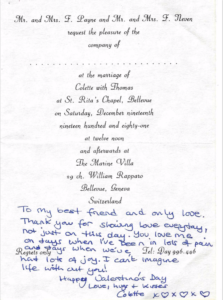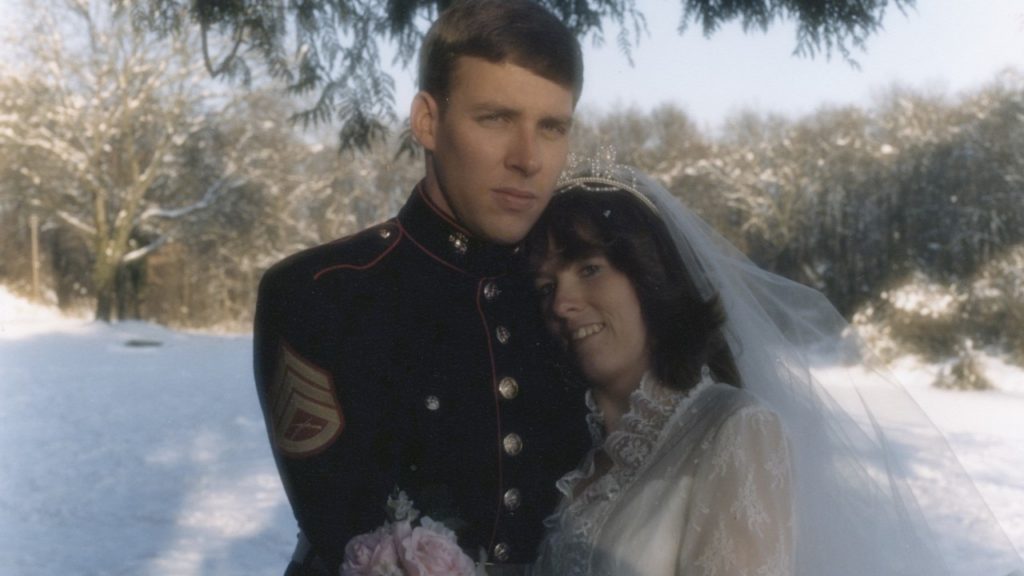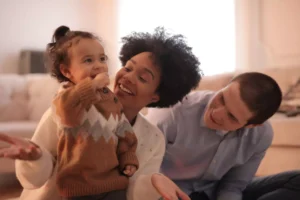Shortly before 9 p.m. on May 15, 2019, my wife, Colette, took a shallow breath but did not exhale. It was the end of a battle that had begun two years earlier when she was diagnosed with stage 3 cervical cancer.
Those two years proved to be a test of the marriage vows I had recited more than 38 years earlier — words that millions have spoken before: “for better, for worse, … in sickness and in health, … till death us do part.” At the time they were mostly abstractions, something you needed to say to get married. But as I learned, they are not abstract. There is a harsh truth behind them, one that gets lost in this season of pink hearts and roses.
Colette and I met at a New Year’s party in Geneva, Switzerland, where I was a U.S. Marine posted to the American embassy, and she, from London, worked at the United Nations. We dated for a year and were married in December 1981, shortly before I returned to the States and was honorably discharged. Our marriage faced mostly the typical newlywed strains of learning to live with and love each other 24/7. Colette worked as a legal secretary while I attended college and grad school on the GI Bill.
Within a few years two children came along. Years blended into years. The initial stage of marriage characterized by eros became the deeper, more permanent storge, the bond of empathy, and philia, the bond of friendship. And always, fitfully and imperfectly, was agape — the sacrificial, self-giving love. Cultivating those four loves became key to enduring the struggle to come.
In the spring of 2017, Colette told me she was going to see the doctor about some lower abdominal pain and bleeding. That doctor referred her to a cancer specialist, which was our first uh-oh moment. A series of tests and a PET scan confirmed the worst: stage 3b cervical cancer. Cervical cancer at that stage has only a 17 percent survival rate over five years, but we were determined to prevail.
Within a week, she started a round of chemotherapy and radiation treatment that would last most of the summer of 2017. I’m not sure what I expected; I pictured the images of women, scarves covering their bald heads, smiling as they conquered cancer. But this was brutal, and there was precious little smiling. Frequent bouts of intense vomiting were interspersed with violent diarrhea. The radiation caused second-degree burns on her abdomen. She suffered several severe infections of the kidney, spending a week in the hospital, too weak to move. She put up a brave front. I was a wreck. We had to stop going to church or going out in public at all, as her immune system was pretty much wiped out. We prayed. A lot. In November 2017, a checkup and scan revealed she was cancer-free. Full remission. We rejoiced.
Slowly life returned to normal, although Colette was very weak. One strange side effect of the therapy is “chemo brain.” In addition to clouding her thinking, the chemo rendered her unable to remember many details of her past. We went to eat at a restaurant we had frequented, one of those places with all the knickknacks on the wall, and she marveled at them. She had zero memory of ever having been there before. She couldn’t remember things from our life together. In a way, she was a different person. The disease was not only affecting our present; it was robbing us of our past.
In early spring 2018, a follow-up CT exam revealed a small spot in her abdomen and one in her lung. The oncologist requested a PET scan, the definitive test to see if they were cancerous. The insurance company refused. They would pay for a biopsy of the spots, but that was it. I was furious; Colette accepted it with equanimity. In fact, during the entire ordeal she never once complained, never once asked, “Why me?” We and the doctor appealed, but they wouldn’t budge. Finally, after discovering that the complexity and expense of doing the biopsies would be prohibitive, the insurance company relented. But we had lost two months at that point.
The PET scan confirmed what we suspected all along. The spots were cancerous, and now there were more of them scattered around her abdomen and lungs. So the summer of 2018 would be spent like the previous summer, undergoing chemo. It would be nice to say I was a saint through all this, selflessly caring for Colette with a smile and a prayer. But it wouldn’t be true. I was angry. I was tired. I was frequently irritable. And that was nothing compared to what she was going through.
As 2018 turned into 2019, Colette grew weaker, and I frequently had to half-carry her to the bathroom and help her while there, cleaning her as one would an infant. I took over all cooking and cleaning. I hated every minute of it. But quitting never occurred to me. I had made a promise those many years earlier, and breaking that promise was never an option. Indeed, it never entered my mind.
Another scan in January 2019 revealed several small spots in her brain, which required more radiation treatment. By early spring she was hospitalized with aplastic anemia, likely a result of the chemo and radiation. She spent 12 days in the hospital receiving whole blood transfusions and was briefly discharged, only to be hospitalized again a week later for another week. The plentiful painkillers were no longer working, and she was upped to a fentanyl patch. On April 30, 2019, her oncologist told her the cancer had metastasized throughout her body. He gave her six months. We hoped, if possible, to make it to Christmas. He said he could order chemo if she wanted, but he advised that it would ravage her already weakened body. Without hesitation, Colette said no. She’d had enough. She knew she was secure in the Lord and was not afraid. She just wanted it to end.
My feelings were crazy and mixed up. I wanted to fight, but I also wanted her suffering to end. Reluctantly, I agreed with her. The cancer was not going to be cured. Better her remaining days not be wracked by chemo and radiation. Better to have one good day than a hundred bad days. The pain they could help control. Knowing her security was in Jesus, we both left it in His hands.
She was admitted to hospice to help get the pain under control. We celebrated Mother’s Day there. With the pain now manageable, Colette was released to die at home. A day later she slipped into a coma and never regained consciousness. It all happened so fast and I was in such a fog of denial that I never had a chance to say goodbye or a final “I love you.” The doctor’s six months turned out to be only two weeks.
In looking back, the pain and heartache of those last two years is slowly replaced by the good memories of the previous 37 years. I can see how even through all the pain and difficulty, God provided: good friends who helped in immeasurable ways, family who traveled long distances to support us, gifted and compassionate doctors and medical professionals who treated us as individuals even though we were no doubt one case among many. We had the pleasure of our children and our first granddaughter. We enjoyed watching our favorite TV game show and bingeing on ”Downton Abbey.”
Time and intention had bonded us in a way that’s almost too hard to describe, a bond that made enduring those final years possible. A love cultivated, slowly and fitfully, over the years, sealed ultimately by God’s grace. It was by His strength alone that Colette could endure her suffering and that I could honor my wedding vows.
There were plenty of pink hearts and roses during our nearly 39 years together — plenty of happy times. But it was Colette’s final Valentine in 2019 that I think best summarizes our marriage. Too weak at that point to go out, she had poked around in some boxes and found an unused wedding invitation and turned it into a homemade Valentine:
“To my best friend and only love. Thank you for showing love every day, not just on this day. You love me on days when I’ve been in a lot of pain and days when we’ve had a lot of joy. I can’t imagine life without you! Happy Valentine’s Day. Love, hugs, & kisses. Colette.”

In marking the beginning and end of our married life together, it was the best Valentine’s gift ever — a memento to a love that had endured for better and for worse, both sickness and health, and ultimately, death.
Copyright 2021 Tom Neven. All rights reserved.











